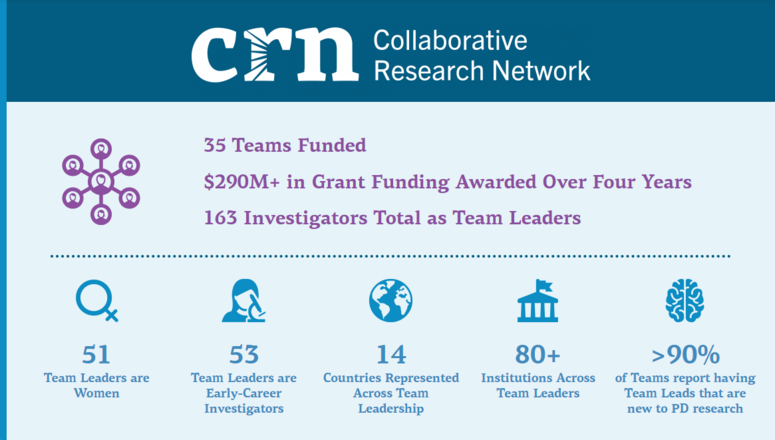

Our Foundation is the implementation partner of the Aligning Science Across Parkinson’s (ASAP) initiative, which is fostering collaboration and resources to better understand the underlying causes of Parkinson’s disease.
ASAP is a coordinated research initiative to advance targeted basic research for Parkinson’s disease. This initiative, announced in 2019, builds on the significant strides made by the research community, funders, other experts and strategists around the world.
With input across sectors and disciplines, ASAP has developed a strategic roadmap to collectively tackle field-wide challenges:
- Support meaningful, multidisciplinary collaboration
- Generate research-enabling resources
- Democratize data
Led by Nobel Laureate Dr. Randy Schekman and Dr. Ekemini Riley, ASAP is working with The Michael J. Fox Foundation to implement its programs. ASAP is managed by the Coalition for Aligning Science. The initiative was incubated at the Milken Institute Center for Strategic Philanthropy with support from the Sergey Brin Family Foundation.
Visit www.parkinsonsroadmap.org to read more on the history and vision of the ASAP initiative.
Read more in ASAP's Blueprint for Collaborative Open Science.
-

Randy Schekman, PhD
Chair of Scientific Advisory Board, ASAP
-

Ekemini A. U. Riley, PhD
Managing Director, ASAP
-

Sonya Dumanis, PhD
Deputy Director, ASAP
The ASAP initiative’s investment in basic research is positioning the field for a seismic shift in understanding of Parkinson’s onset and progression. MJFF is designing our research strategy to complement ASAP programs with continued funding across the development pipeline, from basic discovery work through clinical trials and post-market analysis.
For our latest RFAs, visit our Funding Opportunities page.
ASAP Implementation Partner
In parallel, we are working with ASAP as its implementation partner and have been involved since the initiative’s inception.
The scientific community’s recognition and trust of The Michael J. Fox Foundation as a research partner is an invaluable asset in scaffolding these programs and building toward our shared goals.
– Randy Schekman, PhD, ASAP Chair of Scientific Advisory Board
ASAP has leveraged our grantmaking infrastructure to accept and review proposals and to issue grants to its Collaborative Research Network and its Global Parkinson’s Genetics Program (GP2). In addition, MJFF staff provides business operations support such as coordinating and managing resource acquisitions and data sharing.
Through our partnership, ASAP has also signed on to other consortia that count MJFF as a partner. ASAP is now a member of the Accelerating Medicines Partnership Parkinson’s disease (AMP PD) program managed by FNIH (the Foundation for the NIH) and uniting government, industry and non-profits to support biomarker and target discovery work. (MJFF is a founding member.)
And ASAP is partnering in our landmark study, the Parkinson’s Progression Markers Initiative (PPMI). ASAP support is allowing PPMI to significantly expand its enrollment — bringing together a larger and more diverse group of individuals to increase understanding around how Parkinson's develops and changes over time.
A tenet of the ASAP strategy is research-enabling resources, and the initiative is supporting large-scale programs to build and share a variety of tools.

Global Parkinson’s Genetics Program (GP2)
GP2 is an ambitious five-year program to genotype >150,000 volunteers around the world to further understand the genetic architecture of Parkinson’s disease. Underlying data, analytical processes, and results from GP2 will be made available to the research community as quickly as possible, with minimal barriers to access and use.

Parkinson’s Progression Markers Initiative (PPMI)
ASAP has devoted significant support to our longitudinal PPMI study and has joined the PPMI steering committee to direct the future of this valued resource. PPMI aims to enroll more than 4,000 participants across a variety of cohorts including many with Parkinson’s risk factors who may help learn about how to predict, detect and stop the disease at its earliest stages. All PPMI data is de-identified and open to the researcher community (in addition to available biosamples).

ASAP is funding multidisciplinary research teams to form the ASAP Collaborative Research Network (CRN), which will address key knowledge gaps in the basic mechanisms that contribute to Parkinson’s development and progression. All data resulting from this funded work will be made available to the scientific community at large at the earliest opportunity. Read more on the ASAP CRN.
Circuitry and Brain-Body Interactions RFA
As of 2023, ASAP issued CRN grants to a total of 15 team projects exploring circuitry and brain-body interactions.

Biology of PD-associated Genes and Neuro-Immune RFAs
Through its first CRN funding round, issued in 2020, ASAP is now supporting 21 teams investigating either biology of Parkinson’s-related genes and/or neuro-immune interactions.
Read more on CRN-supported studies on our Funded Studies page.
The funded teams and projects are:
Biology of PD-associated Genes
-
Mapping the LRRK2 Signaling Pathway and Its Interplay with Other Parkinson’s Disease Components
Dario Alessi, Monther Abu-Remaileh, Miratul Muqit, Suzanne Pfeffer
-
Impaired Integration of Organelle Function in Parkinson’s Disease
Pietro De Camilli, Shawn Ferguson, Kallol Gupta, Karin Reinisch, Timothy Ryan, PhD
-
Dissecting the Mechanisms Underlying Disease Progression
John Hardy, Zane Jaunmuktane, Frances Platt, Mina Ryten, Maria Spillantini
-
Mechanisms Overwhelming Protein and Organelle Quality Control in Parkinson's Disease
J. Wade Harper, Ruben Fernandez-Busnadiego, Judith Frydman, Franz-Ulrich Hartl, Brenda Schulman
-
Mechanisms of Mitochondrial Damage Control by PINK1 and Parkin
James Hurley, Erika Holzbaur, Michael Lazarou, Sascha Martens, Eunyong Park
-
In Vivo Approach to Elucidate the Pathobiology of Parkinson’s-associated Genes Using Human Diseased Neurons
Deniz Kirik, Jennifer Johnston, Clare Parish, Lachlan Thompson, Carolyn Sue
-
Senescence in Parkinson’s Disease and Related Disorders
Michael Lee, Jose Bras, Darren Moore, Laura Niedernhofer
-
Cellular Mechanism of LRRK2 in Health and Disease
Samara Reck-Peterson, Stefan Knapp, Andres Leschziner, Florian Stengel, Elizabeth Villa
-
Dissecting Genetic Interactions of Parkinson’s Disease-associated Risk Loci
Donald Rio, Helen Bateup, Luke Gilbert, Dirk Hockemeyer, Frank Soldner
-
Parkinson5D: Deconstructing Proximal Disease Mechanisms across Cells, Space, and Progression
Clemens Scherzer, Xianjun Dong, Mel Feany, Joshua Levin, Su-Chun Zhang
-
Defining the Cellular and Molecular Determinants of Variable Genetic Penetrance in Parkinson’s Disease
Lorenz Studer, Gist Croft, Vikram Khurana, Jian Peng, Joseph Powell
-
IMPACT-PD - Implications of Polyamine and Glucosylceramide Transport in Parkinson’s Disease
Peter Vangheluwe, Tim Ahfeldt, Veerle Baekelandt, Joseph Lyons, Ellen Sidransky
-
Understanding Inherited and Acquired Genetic Variation in Parkinson’s Disease through Single-Cell Multi-omics Analyses
Thierry Voet, Stein Aerts, Guy Boeckxstaens, Christos Proukakis, Bernard Thienpont
-
Mapping the PD Brain: Oligomer-driven Functional Genomics
Nicholas Wood, Sonia Gandhi, Steven Lee, Mina Ryten, Michele Vendruscolo
Neuro-immune Interactions
-
From Cancer Associations to Altered Immunity in the Pathogenesis of Parkinson’s Disease
Xiqun Chen, Timothy Chan, Weiyi Peng, Michael Schwarzschild
-
Tracing the Origin and Progression of Parkinson’s Disease through the Neuro-Immune Interactome
David Hafler, Sreeganga Chandra, Rui Chang, Noah Palm, Ramnik Xavier
-
Activation of Transposable Elements as a Trigger of Neuroinflammation in Parkinson’s Disease
Johan Jakobsson, Roger Barker, Molly Hammell, Agnete Kirkeby
-
Co-Pathologies Drive Neuroinflammation and Progression in PD
Jeffrey Kordower, Ashley Harms, Warren Hirst
-
Genome-Microbiome Axis in the Cause of Parkinson Disease: Mechanistic Insights and Therapeutic Implications from Experimental Models and a Genetically Stratified Patient Population
Anthony Schapira, Fabio Blandini, Michela Deleidi, Donato Di Monte, Stanislav Ehrlich
-
Adaptive Immunity in the Etiology and Progression of Parkinson’s Disease
David Sulzer, Cecilia Arlehamn, Ashley Harms, Sarkis Mazmanian
Circuitry and Brain-Body Interactions
-
Understanding and Manipulating Cellular and Circuit-level Vulnerability to Neurodegeneration in Parkinson’s Disease
William C. Mobley, Thomas Biederer, Elena O. Gracheva, Dani S. Bassett, Michael James Higley, Michael Henderson
-
Circuit Mechanisms for Dopamine Neuron Vulnerability and Resilience in Parkinson’s Disease
William C. Mobley, Nicole Calakos, Calga Eroglu, Scoot H. Soderling, Michael R. Tadross, Sergiu Pasca
-
Role of Enteroendocrine Cells in the Origin of Parkinson’s Pathology
William C. Mobley, Rodger A. Liddle, Haydeh Payami, Timothy Sampson, Malú G. Tansey, Andrew West
-
Reconstituting the Lost Nigrostriatal Circuitry in Parkinson’s Disease
William C. Mobley, Xiang-Dong Fu, Yuanchao Xue, Steven F. Dowdy, Allen Wang
-
Gut-to-brain Circuit Contribution to Parkinson-like Phenotypes in Disease Models
Viviana Gradinaru, Andrew Fox, Sarkis, Ashley W. Seifert, David Van Valen
-
Alpha-synuclein Effects on Gut-brain Circuits and Pre-motor Symptoms in Parkinson’s Disease
Michael Gordon Kaplitt, Ted M. Dawson, Per Svenningsson, Roberta Marongiu
-
Olfactory Circuits: Alpha-synuclein-rich Neurons Respond to Environmental Triggers at the Origin of Parkinson’s Disease
Michael G. Schlossmacher, Bejamin Arenkiel, Brit Mollenhauer, Christine Stadelmann, Maxime Rousseaux
-
Basal Ganglia Networks in Parkinson’s Disease
Peter L. Strick, Scott T. Grafton, Helen N. Schwerdt, William R. Stauffer, Robert S. Turner
-
Distributed Circuit Dysfunction Underlying Motor and Sleep Deficits in a Progressive Model of Parkinson’s Disease
D. James Surmeier, Rui M. Costa, Silvia Arber, Yang Dan, Ann Kennedy
-
Cortical Pathophysiology of Parkinsonism
Thomas Wichmann, Hong-Yuan Chu, Adrianna Galvan, Yoland Smith
-
Engineering Research-enabling Cells to Fuel Mechanistic Studies of Parkinson’s Disease
Mark R. Cookson, Michael E. Ward
-
Redefining Parkinson’s Disease Pathophysiology Mechanisms in the Context of Heterogeneous Substantia Nigra Neuron Subtypes
William C. Mobley, Rajeshwar Awatramani, Loukia Parisiadou, Daniel Dombeck, Mark D. Bevan, Thomas Hnasko
-
Mapping the Modulatory Landscape Governing Striatal Dopamine Signaling and Its Dysregulation in Parkinson’s Disease
William C. Mobley, Stephanie Cragg, Mark Howe, Peter J. Magill, Konstantinos Meletis, Richard Wade-Martins
-
Dual Role of Neural Activity in Parkinson’s Disease
William C. Mobley, Robert H. Edwards, Alexandra Nelson, Kira Poskanzer, Ken Nakamura, Zayd Khaliq, Glenda Margaret Halliday, Chris Ford
-
Activity and Connectivity Drive Neuronal Vulnerability and Disease Progression in Parkinson’s Disease
Miguel Vila, Glenda Margaret Halliday, José A. Obeso, Matthias Prigge, Nicola Biagio Mercuri